HeadlinesAugust 07, 2023
Nigerien Coup Leaders and Supporters Remain Defiant as ECOWAS Deadline to Restore Bazoum Passes
In Niger, leaders of the military coup have shut down the country’s airspace, citing possible imminent military action from their neighbors after a Sunday deadline to reinstate ousted President Mohamed Bazoum expired. The deadline was issued by the West African bloc ECOWAS, which has condemned the coup, alongside international powers including the U.S. and former colonizer France. But many Nigeriens have voiced support for the military leaders and strongly reject any foreign intervention. Protesters have been taking to the streets since the July 26 coup.
Ibrahim Bana: “If ECOWAS or French forces decide to attack our country, before reaching the presidential palace they will have to walk over our bodies, spill our blood. And we’ll do it with pride, because we don’t have another country. We only have Niger. Since July 26, our country has decided to take charge of its independence and sovereignty, and this is our way of demonstrating it.”
Media reported this weekend Niger’s coup generals requested defense help from the Russian mercenary Wagner Group in the face of possible military intervention. Burkina Faso and Mali, which also have been taken over by the military following coups, previously warned any attacks on Niger would be tantamount to a “declaration of war” against their countries, as well. Niger is a major supplier of uranium to France and the European Union.
Attacks by Ukrainian and Russian Forces Intensify as World Leaders Meet in Jeddah for Peace Talks
Ukraine says Russian strikes have killed three people in Kherson and Kharkiv. Meanwhile, Moscow said it shot down a drone near the capital Sunday, while Ukrainian attacks hit bridges linking Crimea with Russian-occupied parts of Kherson. On Friday, Ukrainian drones hit a Russian tanker in the Black Sea and a Russian port. On Saturday, Russian strikes hit a blood transfusion center, which Ukrainian President Volodymyr Zelensky called a war crime.
The intensified attacks on the battlefield come as officials from around the world met in Saudi Arabia for peace talks. Forty different countries were at the talks, including the U.S., China and nations from the Global South. Russia was not present. Ukraine and other countries hailed the talks as “progress,” though few concrete steps were taken.
Ukrainian Authorities Charge Peace Activist Yurii Sheliazhenko, Raid His Home
Ukrainian peace activist Yurii Sheliazhenko was charged by the Ukrainian government with justifying Russian aggression, days after his apartment was raided and searched. Sheliazhenko, member of the Ukrainian Pacifist Movement and World BEYOND War, has vocally opposed any escalation of the conflict through fighting or sanctions. He spoke Sunday of his persecution by Ukrainian authorities.
Yurii Sheliazhenko: “During a year, security services secretly surveilled me, tried to find any links with Russian agents, found nothing, but still convinced I am the enemy because of my advocacy of peace by peaceful means of ceasefire and peace talks to stop senseless bloodshed and destruction.”
Sheliazhenko also said he would remain in Ukraine and continue his peace work from behind bars if he is imprisoned. Click here to see our interviews with Yurii Sheliazhenko.
Ex-Pakistani PM Imran Khan Calls for Supporters to Keep Up Protests as He Receives 3-Year Sentence
In Pakistan, former Prime Minister Imran Khan has been arrested and sentenced to three years in prison for illegally selling state gifts. Khan has denied this and the dozens of other charges that were brought against him since he was removed in a no-confidence vote in April of last year. Before his arrest, Khan called on his supporters to keep protesting.
Imran Khan: “I have only one appeal: Don’t sit silently at home. I am struggling for you and for the country and your children’s future.”
Khan’s lawyer has accused Pakistan of “undeclared martial law” in their politically motivated targeting of the former leader, who will likely be barred from national elections that are supposed to take place this year.
In other news from Pakistan, a train derailment in the southern Sindh province Sunday killed at least 30 people and injured dozens. The death toll could rise as rescue operations continue.
Rahul Gandhi, Lawmaker Critical of Narendra Modi, Reinstated to Indian Parliament
In India, opposition Congress Party leader Rahul Gandhi has been reinstated to Parliament after the Supreme Court suspended his defamation conviction. Gandhi was suspended and sentenced to two years in prison in March for criticizing Prime Minister Narendra Modi. The suspension of the case means Gandhi will be able to run against Modi in the 2024 elections.
Another Bloody Weekend in the West Bank as Israelis Kill at Least 5 Palestinians, Incl. Teenagers
In the occupied West Bank, Israelis killed at least five Palestinians over the weekend. Three people were shot dead Sunday after Israeli soldiers opened fire at their vehicle at the Jenin refugee camp. Just two days earlier, 18-year-old Mahmoud Abu Saan was killed by Israeli forces during a raid in the city of Tulkarem. Later that Friday, 19-year-old Qusai Matan was murdered by armed Israeli settlers who stormed the village of Burqa near Ramallah. Two suspects have been arrested, praised by Israel’s National Security Minister Itamar Ben-Gvir as “heroes.” Laila Ghannam, governor of Ramallah, cited the complicity of the international community in Israel’s abuses against Palestinians as she spoke following the killing.
Gov. Laila Ghannam: “Today there was a real massacre in Burqa. The settlers burned cars, and the child was assassinated from zero distance, according to witnesses. And we have to call him a 'child' and use the correct words and labels for these crimes.”
Saudi Arabia, U.K. Issue Warnings to Citizens in Lebanon Amid Clashes in Palestinian Refugee Camp
Saudi Arabia is urging its citizens to immediately leave Lebanon amid recent violent clashes at the largest Palestinian refugee camp, located in the southern city of Sidon. The U.K. has also advised people to avoid most travel in Lebanon, while Kuwait warned its citizens to avoid “areas of security disturbances.” At least 13 people have been killed after fighting erupted between rival Palestinian groups inside the overcrowded Ein el-Hilweh refugee camp last week.
At Least 16 Asylum Seekers Died at Sea in Recent Days en Route to Europe
At least six migrants have died, including a woman and her 1-year-old child, after three boats sank in the Mediterranean Sea, one off Tunisia’s Kerkennah Islands and two near the Italian island of Lampedusa. Dozens of people are still missing. Most of the migrants are from sub-Saharan Africa. Separately, Tunisian authorities said they had found the bodies of another 10 people on a beach near the port city of Sfax, which has become a hub for migrants hoping to reach Europe for refuge.
Court Rules Lifetime Disenfranchisement of People with Felonies in Mississippi Is Unconstitutional
Here in the U.S., a federal appeals court Friday struck down a Jim Crow-era law in Mississippi that permanently revoked voting rights for people with certain felony convictions. The conservative panel ruled 2 to 1 that the law, which disproportionately affects Black Mississippians, is unconstitutional, writing, “In the last 50 years, a national consensus has emerged among the state legislatures against permanently disenfranchising those who have satisfied their judicially imposed sentences and thus repaid their debts to society. Mississippi stands as an outlier among its sister states, bucking a clear national trend in our nation against permanent disenfranchisement.”
Texas Judge Rules Abortion Ban Is Too Restrictive; TX AG Blocks Order, Keeping Ban in Place for Now
A Texas judge ruled Friday the state’s abortion ban is too restrictive in cases of dangerous pregnancy complications, and doctors must be allowed to perform abortions in such instances without risk of criminal prosecution. Hours later, Texas’s Attorney General’s Office filed an appeal, effectively blocking the order. Though the initial order was blocked, the Center for Reproductive Rights and the women who brought the case celebrated the ruling and said the plaintiffs’ testimonies helped shine a spotlight on the cruelty of the law. The trial, expected to clarify the use of abortions in medical emergencies, is scheduled for March of next year.
Ohio Voters Cast Ballots in GOP Measure That Could Affect Abortion Rights
Meanwhile, in Ohio, early voters are turning out in droves in a special election over a Republican-led measure that would make it harder for Ohio voters to pass constitutional amendments, including a ballot measure which would guarantee Ohioans the constitutional right to an abortion. The final day of voting is tomorrow, Tuesday.
FDA Approves First-Ever Pill to Treat Postpartum Depression
The FDA on Friday approved the first pill to treat postpartum depression, which affects around one in seven people after childbirth. Doctors say only around 10% of those receive adequate care. Zuranolone, to be sold under the name Zurzuvae, is manufactured by Biogen and Sage Therapeutics and is taken for just two weeks.
But mental health experts warned that while the pill could help many people, it is not a cure-all for postpartum mood disorders. Behavioral scientist Judite Blanc noted the many contributing factors, including poor institutional support and policies for new parents, with women of color and of lower socioeconomic status being the most vulnerable. Blanc told The Washington Post, “We need longer maternity leave, more flexible work schedules and universal child care.”
Teenager Charged with Hate Crime in Brooklyn Murder of Black Dancer O’Shae Sibley
Here in New York City, police have charged a 17-year-old with murder as a hate crime for the fatal stabbing of O’Shae Sibley at a Brooklyn gas station late last month. Twenty-eight-year-old Sibley, a Black gay man, was a dancer and choreographer. Sibley and his friends were dancing to Beyoncé’s “Renaissance” album as they filled up on gas on a Saturday night, when they were approached and harassed by a group of people who told them to stop dancing. The group yelled homophobic and racist slurs as the dancers defiantly carried on, before the teen stabbed O’Shae Sibley. Vigils and protests have taken place across the city since then. Mourners gathered at the Mobil station Friday where Sibley was killed, while others have posted videos of themselves vogueing in tribute to O’Shae Sibley.
Charles Ogletree, Prominent Civil Rights Defender and Harvard Law Professor, Has Died at Age 70
The influential Harvard Law professor and civil rights scholar Charles Ogletree has died at the age of 70. At one of the country’s most prominent law schools, he taught the future president and first lady, Barack and Michelle Obama. He also represented Anita Hill when she accused U.S. Supreme Court nominee Clarence Thomas of sexual harassment, defended rapper Tupac Shakur in criminal and civil cases, and fought for reparations for survivors of the 1921 Tulsa race massacre.
In 2010, Ogletree joined us on Democracy Now! to discuss his book, “The Presumption of Guilt: The Arrest of Henry Louis Gates, Jr. and Race, Class and Crime in America.”
Charles Ogletree: “The title, 'The Presumption of Guilt,' is to remind us we presume guilty of some people without knowing the facts. We do it based on race, on class, on clothing, on where you drive, where you walk, where you shop, where you eat. And that’s why 'The Presumption of Guilt' is the title, to remind people, let’s not make judgments about people. Let’s judge them by, as I said before, the content of their character, not skin color. That’s the problem.”
Trump Faces Deadline in DOJ Protective Order Request as He Can’t Stop Posting About His Indictments
Donald Trump has been given a deadline of 5 p.m. today, Monday, to respond to special counsel Jack Smith’s request for a protective order. District Judge Tanya Chutkan, who is presiding over Trump’s case related to overturning the 2020 election, issued the deadline as the Justice Department attempts to curb Trump’s public comments, including potentially confidential evidence, that could intimidate witnesses. On Friday, Trump posted on his Truth Social site, “IF YOU GO AFTER ME, I’M COMING AFTER YOU!”. Separately, Trump pleaded not guilty Friday to additional charges in the federal case around his mishandling of classified documents.
A Black Mother Is Suing After She Was Wrongfully Arrested Due to Faulty Facial Recognition ID
A woman is suing the city of Detroit after she was wrongfully arrested for robbery and carjacking over faulty facial recognition technology. Porcha Woodruff was eight months pregnant and getting her two children ready for school when six police officers showed up at her home in February to take her into custody. Woodruff was detained and questioned for at least 11 hours before being charged and released on a $100,000 bond. She says she started having contractions in jail and had to be taken to the hospital after her release due to dehydration. The case was dropped a month later.
Woodruff is the first woman known to be falsely identified as a criminal suspect due to facial recognition technology. At least five other people have also been wrongfully arrested due to the technology — all of them Black. Activists have long warned facial recognition technology and artificial intelligence would exacerbate racial inequity in policing, disproportionately impacting Black people.
Japanese Leaders Call for Global Nuclear Disarmament on the 78th Anniversary of Hiroshima Bombing
Sunday marked the 78th anniversary of the U.S. dropping the world’s first atomic bomb on Hiroshima, killing some 140,000 people. Three days later, on August 9, 1945, the U.S. dropped another atomic bomb on the Japanese city of Nagasaki, killing an estimated 74,000 people. During the annual Hiroshima Peace Memorial Ceremony, Japanese leaders called on nations around the world to work toward nuclear disarmament. This is Hiroshima Mayor Kazumi Matsui.
Mayor Kazumi Matsui: “Leaders around the world must confront the fact that the theory of nuclear deterrence is folly and that it is necessary to quickly begin concrete efforts to lead us from our harsh reality to an ideal world.”
Most popular
- 1
- 2
- 3
- 4
Non-commercial news needs your support
Please do your part today.

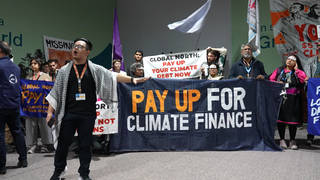
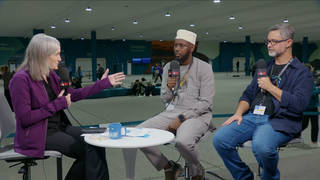
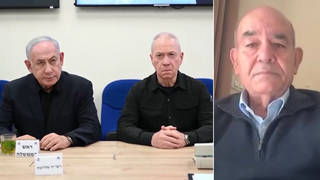
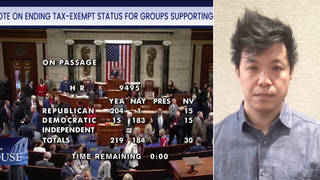





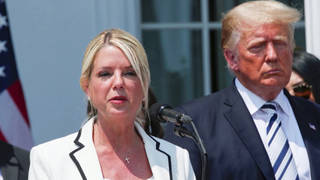
Media Options